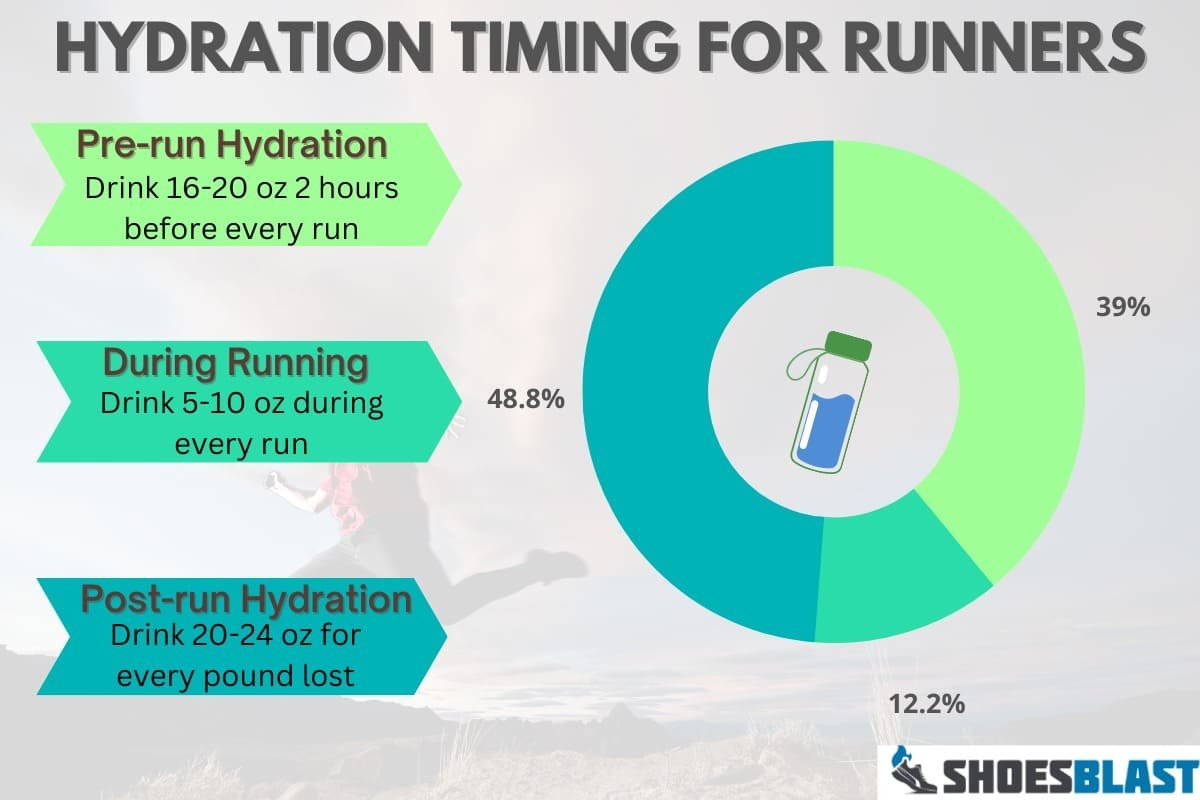Jane is in the middle of the running track when she suddenly feels her head spinning, her muscles getting stiff and the running track getting blurred right in front of her eyes.
Until she realizes she forgot to hydrate herself in the morning.
If you’ve been an avid runner like Jane, you might’ve felt dehydrated while running, leaving you wondering how much water you need to drink to get back in shape. Or how much water should you drink while running?
Rest assured! Dehydration and running often go hand in hand, but as a regular runner, you must understand the strategy to prevent severe dehydration.
In this article, we’ll walk you through the importance of hydrating yourself as a runner and the amount of water your body needs to complete your running trail safely.
Let’s cut to the chase!
Why Does Staying Hydrated During Running Matter?
As soon as you hit the running trail, your body goes through a transition. There is a gradual rise in body temperature and heart rate, which initiates a body response. Eventually, your body removes heat in the form of sweat to return to an optimal temperature.
Losing salts and water in the form of sweat pushes your heart to pump blood with greater force. When you do not replenish the salts and water during running, your body shifts from mild to severe dehydration. As a result, your running performance rack and ruins in no time.
According to a study, a person loses 3 to 4 liters of fluid in an hour during exercise. Therefore, replenishing the lost fluid is essential to maintain energy during your running stride.
An ample amount of fluid is required for a high-intensity workout, marathon running, or slow running. Not only does it help to regulate the body temperature, keeping you cool and warm, but it also keeps your joints lubricated.
How To Know The Right Quantity of Water Required By Your Body?
Hydration needs for everyone are different depending on your sweat rate, physique, environment, and health. Therefore, there are no universal rules for how much water you need to drink during running.
Nonetheless, as a long-distance or short-distance runner, you should know the right quantity of water required by your body. And a general way to calculate it is by using the following formula,
Ounces per day your body needs= body weight (lbs) × 0.5
Another simplest way runners determine their hydration needs is by calculating their sweat rate. This is done by measuring your weight before doing exercise and after exercise. If the weight loss is more, then your fluid intake should increase.
Total water loss= (Pre-run weight – Post-run weight) + amount of water drank (in grams)
You can replenish the fluid by drinking the amount of water lost. However, total water loss depends on weather conditions, altitudes, and running pace. The key is to measure the water loss seven days a week and take an average to calculate the water lost in sweat.
How Much Water Should You Drink As A Runner?
There are no universal rules for your daily fluid uptake, but some basic guidelines can help you set your fluid intake.
Pre-run Hydration
Most expert runners suggest taking 16-20 ounces of fluid (two cups) at least an hour before your run. If you feel thirsty during running, taking only a few sips is suitable because too much fluid can hinder your running pace.
If you’re going for a long run (longer than 8 miles), generally, 20 ounces of water with your meal should be enough to keep you well hydrated.
Drinking While Running
Your fluid intake during running depends on your sweat rate, environment, and running length. If you’re a long-distance runner, drinking a small amount of fluid every 15-20 minutes is essential to keep yourself well-hydrated.
Furthermore, expert runners always recommend beginner runners prepare a hydration strategy according to their sweat rate. You can also determine landmarks or set a timer that reminds you to take a few sips of water during your run.
Do not gulp water during your run otherwise, you’ll feel it sloshing in your stomach, negatively affecting your running pace.
Post-Run Hydration
Drinking fluids after your running session will rehydrate the fluid lost. Check your weight after running and remember to use 20 to 24 oz of fluid for every pound you lost.
If you can’t track your fluid intake throughout the day, you can monitor the color of your urine. A light straw color urine means you’re well hydrated and a dark color urine indicates replenishing yourself with ample fluid throughout the day.
3 Hydration Tips That Keep You Hydrated
Hydration is not only about monitoring your water intake but also replenishing your salts and electrolytes that are lost in the form of sweat. Here are three hydration tips by an expert marathon runner that will keep you on track, safe, and healthy.
1. Drinking Water Regularly Throughout The Week
Anna Harding, a marathon runner, recommends developing a habit of drinking water regularly even when you’re not thirsty. If you’ve been drinking ample water throughout the week, you do not have to worry about dehydration during short-distance running that lasts for less than 45 minutes.
2. Calculate Your Sweat Rate
As mentioned above, you can determine the amount of water your body needs to cover the water loss during a high-intensity exercise. Following are the steps to calculate your sweat rate:
- Before you go for a run, jump on the scales and weigh yourself without any clothes on.
- Go for a 1-hour run and note down your water intake in grams.
- After your running session, towel off all the sweat and weigh yourself again.
- Subtract the pre-run and post-run weight and calculate your water loss using the formula below.
3. Have Fluids Ready During Your Run
Plan your run a day before by getting your water bottles ready to easily access water whenever you feel thirsty. Whether you prefer a hand-held bottle, bladder packs, or soft flasks, you can easily carry water bottles and replenish the lost water easily.
The Bottom Line
In short, drinking enough water before and after running is essential to enjoy a safe and healthy running ride. As a regular runner, the best method to replenish the lost fluid is to track your hydration and sweat rate throughout your runs and adjust your water and electrolyte intake according to your daily body requirement. Also, look at 5 ways to carry a water bottle while running.

PharmD, Salim Habib University | A Medical and Healthcare Writer



